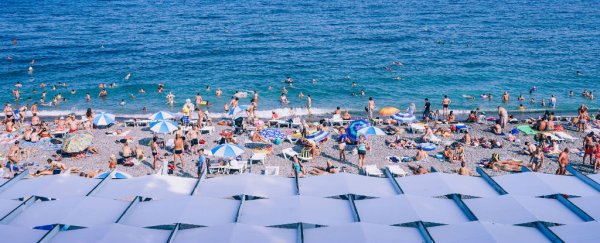Everybody knows that going on holiday is a great way to reduce the stress of daily life, but just how much better do vacations really make us feel, and why?
A new study comparing the biological effects of vacationing and meditation has found that both activities confer significant, and in some cases long-lasting, physiological benefits – with the best results seen in those who do both at the same time.
"It's intuitive that taking a vacation reduces biological processes related to stress," said psychiatrist Elissa S. Epel from the University of California, San Francisco, "but it was still impressive to see the large changes in gene expression from being away from the busy pace of life, in a relaxing environment, in such a short period of time."
To gauge how vacationing and meditation affect biomarkers related to processes such as ageing and general health, the researchers recruited 94 healthy women aged between 30 and 60 to take part in a six-day retreat at a resort in California.
Among the participants, 64 were not regular meditators. This group was randomly assigned to either simply enjoy their time at the resort with no further obligations – and they call this science! - or enroll in a meditation training program while at the resort.
The remaining 30 participants were classified as "experienced" meditators, and this group was asked to take part in the meditation training program for the duration of the retreat.
The researchers took blood samples from all the participants immediately before and after the vacation. They also surveyed the participants before and after the retreat to assess their mental state, with follow-up surveys taking place one month and 10 months after the vacation.
When comparing the before-and-after blood samples, the researchers examined some 20,000 genes to track changes in gene expression induced by the effects of vacationing and mediation.
They found all three groups showed significant improvements in stress levels and the functioning of the immune system. For the experienced meditators, biomarkers associated with antiviral activity also showed a boost.
"[O]ur results point to both a significant 'vacation effect' that benefitted all groups, and a suppression of stress-related responses and immune function related to acute-phase wound healing and inflammation," the authors write in Translational Psychiatry.
"We also identified a 'meditation effect' within the regular meditator group, characterised by a distinct network of genes with cellular functions that may be relevant to healthy ageing."
The post-resort surveys indicated that all participants reported increased feelings of well being even a month after their holiday, and again the biggest benefits were seen in those who took part in meditation while on the retreat – with novice meditators reporting fewer feelings of depression and less stress even 10 months after the retreat.
The findings could help shed some new light on the physiological and long-term effects of meditation – an area that scientists have long studied and debated, but which is still turning up some surprises.
"Based on our results, the benefit we experience from meditation isn't strictly psychological; there is a clear and quantifiable change in how our bodies function," said neurologist Rudolph Tanzi from Harvard University.
"Meditation is one of the ways to engage in restorative activities that may provide relief for our immune systems, easing the day-to-day stress of a body constantly trying to protect itself," he added. "The prediction is that this would then lead to healthier ageing."
The findings come on the back of research from earlier in the year that found that meditation could lead to reduced levels of a key inflammation biomarker – called Interleukin–6 – which has previously been linked to diseases including cancer, Alzheimer's, and autoimmune conditions.
A prior study from 2014 also suggested that practising meditation and yoga can influence our cellular activity.
Researchers in Canada found that telomeres – which form part of our chromosomes and are thought to be responsible for controlling how we age – could be affected by taking part in meditation or support group activities.
In the study, breast cancer survivors who practised meditation or were part of a support group showed no shortening of their telomeres, while shortening was seen in a control group that didn't engage in the activities. The finding could be significant, because shorter telomeres are associated with a greater risk of disease, in addition to cellular ageing.
"We already know that psychosocial interventions like mindfulness meditation will help you feel better mentally, but now for the first time we have evidence that they can also influence key aspects of your biology," said one of the researchers, Linda E. Carlson from the Tom Baker Cancer Centre, at the time.
While the results of the latest study are also promising, the researchers acknowledge that their relatively small experiment will need to be confirmed by larger samples, so we can find out what's really going on here.
In the meantime, there's no reason at all not to book that vacation you've had lingering in the back of your mind. Based on the evidence here, getting away from it all does us a world of good.
